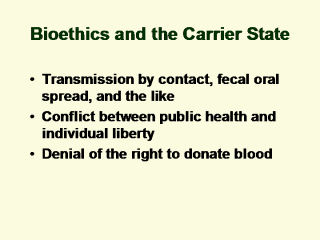 |
During the course
of our work a number of bioethical questions have arisen It has been
recognized that hepatitis B may be transmitted by means other than
transfusion, i.e. by contact, fecal-oral spread, insects, etc. The current
estimate is more than 1 million carriers in the USA and 375 million carriers
world wide. This has led to a situation which may be unique in medicine.
Although some carriers may be able to transmit hepatitis by means other than
blood transfusion, this is probably not true for many (or most) carriers. It
is now known that HBV can be transmitted sexually, from mothers to children
by the use of "dirty needles", and by other means. The bioethical problems
that are raised from the studies of hepatitis carriers can be viewed as a
conflict between public health interests and individual liberty. When the
risk to the public is clear, and the restrictions on personal liberties are
small, there is little problem in arriving at appropriate regulations. For
example, the transfusion of blood containing hepatitis B antigen is a
disadvantage to the patient recipient and it has been stopped. The denial of
the right to donate blood is not a great infringement of personal activity
and the individuals concerned and society have agreed to accept this
moderate restriction. The problems raised by person-to-person transmission
are more difficult.
The AIDS epidemic started after the publication of this paper. The
ethical problems associated with the carrier state have been a major concern
to public health authorities, the HIV carriers, and others. |
